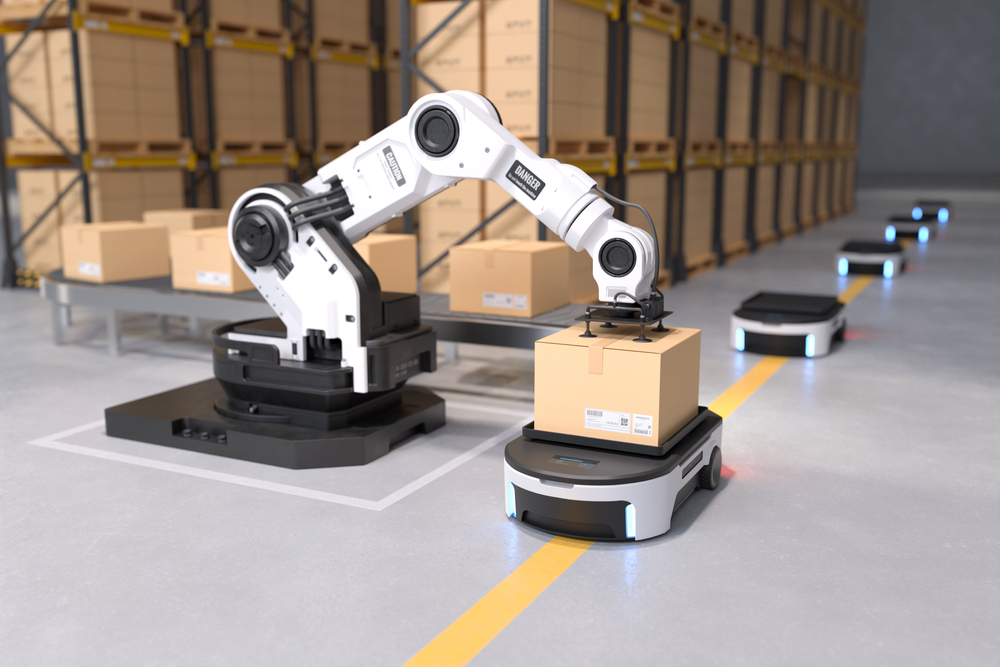How Warehouse Robotics are Changing the Supply Chain
The COVID-19 pandemic has accelerated the efforts of manufacturers and logistics companies to incorporate new technologies to meet growing demand while also operating with fewer employees. As disruptions such as product shortages, lack of delivery capacity, and an ongoing labor crisis continue to impact the global supply chain, companies continue to test and adopt automation solutions, and warehouse robotics are proving to be a game-changer.
The Rise of Warehouse Robotics
A recent study found that the global warehouse robotics market size is expected to nearly double from $4.7 billion in 2021 to $9.1 billion in 2026. Increasing consumer demand and the need for quick and accurate order fulfillment have many companies realizing that to remain competitive, they cannot rely solely on the current workforce. Leaders in warehouse robotics development and implementation include:
- Amazon recently opened a new robotics factory in Massachusetts. The facility will make robotic platforms called “drive units” that can lift and transport shelves of merchandise to stations where workers can pick, pack, and ship items efficiently.
- Saks Fifth Avenue launched stand-alone e-commerce units in its Pennsylvania warehouse. The robots help workers locate items, speeding up the fulfillment process immensely.
Using Robotics in a Warehouse Environment
Robots can be used in many ways throughout the fulfillment process, including locating an item in the warehouse, placing, packing, transportation, and stocking inventory. There are numerous types of warehouse robotics that can be used to fit a company’s specific needs. These include:
- Robotic arms
- Collaborative bots
- Mobile rack Goods-To-Person (GTP) AMR robots
- Roaming shuttle arms
- Unit load transportation autonomous mobile robots
- Bot sorter arms
Benefits of Implementing Robots
Enhanced Employee Experience
A common industry misconception is that the rise of warehouse robotics will take over warehouse jobs one day. But as more and more companies begin to implement these technologies, the industry is finding that the use of robotics is actually enhancing employees’ quality of work, significantly increasing their safety and efficiency, while helping to create the flexible work environment most individuals are currently seeking. These robots are designed to assist with day-to-day operations, but not to replace the workforce.
Positive Environmental Impacts
Consumers are growing more aware of the impact the products they use and purchase have on the environment, putting more pressure on manufacturing and logistics companies to maintain environmentally friendly operations. The implementation of warehouse robotics can significantly decrease the amount of waste a fulfillment center creates by closing the margin of error. For example, if robots are used to pick and package orders, the likelihood of either having to repack that order or the consumer requesting a replacement is minimized, reducing the wasteful consumption of packaging and fuel.
Improved Supply Chain Operations
One of the most important benefits of warehouse robotics is increased productivity. With consumer demand at an all-time high, it is important that fulfillment centers do everything they can to increase efficiency. Automation technology, such as robotics, is key to helping the supply chain adapt to this new era of decreasing supply and rising demand.
Companies looking to increase efficiency may also consider using plastic pallets from iGPS, which are lighter, more durable, and 100% recyclable. They also incorporate RFID technology, making them traceable and readable by automated systems.
Logistics and fulfillment centers are at the center of global commerce; therefore, every improvement they make positively impacts the supply chain. Warehouse robotics are among the many efficiencies being introduced to streamline operations and get products into consumers’ hands more quickly. As the supply chain continues to navigate its current challenges, companies are exploring every option to increase efficiency and remain competitive.
Companies committed to incorporating supply chain efficiencies, including warehouse robotics, use iGPS plastic pallets for all their shipping needs. Our lightweight, recyclable plastic pallets flow seamlessly through warehouse automation systems and reduce Total Cost of Business. For more information, contact us at 1-866-557-0047, email a specialist at switch@igps.net, or visit our contact page.



